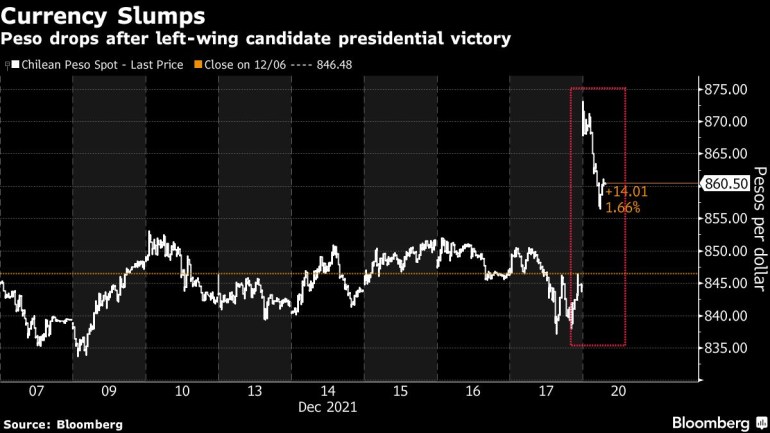Chile assets slump after left-wing leader Boric wins presidency
Investors are concerned Gabriel Boric’s policies will upend one of the wealthiest economies in Latin America with higher taxes, increased social spending and more government regulation of business.

Chilean assets tumbled after left-wing candidate Gabriel Boric rolled to a blowout victory in Sunday’s presidential election, giving him a broad mandate to push ahead with an overhaul of Latin America’s most open economy.
The peso, overseas bonds and the country’s main stock gauge fell the most in months, with the currency down 3% at one point and equities more than 5% lower. The losses abated by mid-morning as analysts warned the market may be overreacting to an excessively pessimistic outlook.
Keep reading
list of 4 itemsChilean democracy faces a critical test
Lucia Hiriart, widow of Chilean dictator Pinochet, dies at age 99
Chile to elect its next president as ‘very close race’ wraps up
Investors are concerned Boric’s policies will upend one of the wealthiest economies in Latin America with higher taxes, increased social spending and more government regulation of business. Boric, a lower house deputy who rose to fame as a student protest leader, beat his conservative rival Jose Antonio Kast by more than 10 percentage points in a second round that just days ago had looked too close to call.
But the candidate was somewhat conciliatory in remarks after he had been declared the winner, and said he would work with a divided Congress to be a president for all Chileans.
“His policy platform is not particularly radical,” said Graham Stock, a strategist at BlueBay Asset Management in London. “We’ve already priced in the risk of large deficits, but it won’t get out of control.”
 Chile’s benchmark stock index traded 3.7% lower as of 9 a.m. in New York, after losing as much as 7.5%. The peso fell 1.9% to 861.55 per dollar. Yields on the country’s dollar-denominated bonds due in 2050 rose 8 basis points to 3.3%.
Chile’s benchmark stock index traded 3.7% lower as of 9 a.m. in New York, after losing as much as 7.5%. The peso fell 1.9% to 861.55 per dollar. Yields on the country’s dollar-denominated bonds due in 2050 rose 8 basis points to 3.3%.
Boric, 35, describes himself as a moderate socialist who shuns the hard-left models of Cuba and Venezuela, and his coalition included a variety of left-wing parties. After the first-round vote last month, Boric moderated his message to appeal to voters in the center.
He reiterated in a speech Sunday that he will seek to maintain fiscal discipline as he advances his reforms, which include raising taxes on the rich and mining industry, rejecting projects that damage the environment, improving social services and dismantling the private pensions system.
His administration will face enormous challenges, including a split congress, a sharp economic slowdown, the writing of a new constitution and the lingering threat of social unrest.
Volatility in Chilean assets will dwindle in the coming days as the president-elect appoints a cabinet that isn’t “hostile to markets,” according to LarrainVial Research. The key signal will be his finance minister, the firm said.
Citigroup strategists Fernando Jorge Diaz and Andrea Kiguel said a “knee-jerk” selloff in the peso after the vote could be an opportunity to buy assets on the cheap.
Others were less optimistic.
Chileans came out en masse to vote Sunday, with the highest turnout since the return of democracy in 1990. Combined with the wide margin of victory, it could be seen as a strong mandate for the victor, according to Win Thin, global head of currency strategy at Brown Brothers Harriman & Co.
“While Boric has taken pains to stress that his economic model will not be a radical one, it’s clear that the market-friendly policies are likely a thing of the past,” he said. “Chile is moving on to a new path with an unknown destination.”